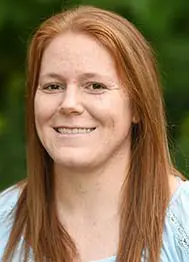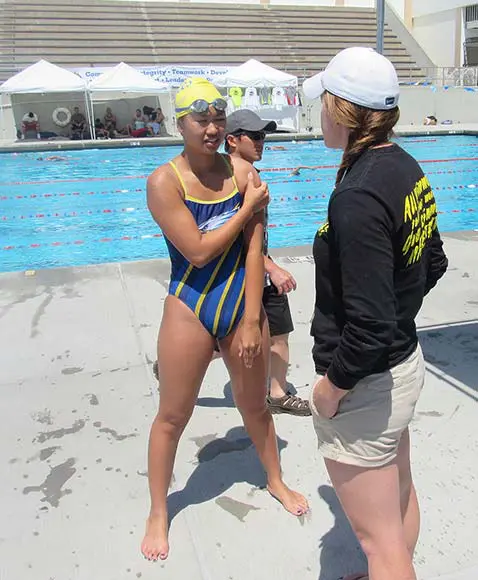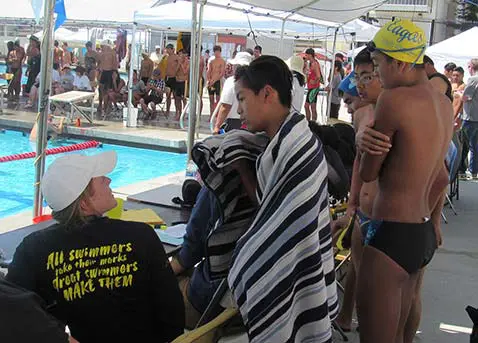RISE PERSPECTIVE
July 11, 2018
Coaches Must Support Racial Identity of Athletes in Swimming
By Lauren Walker

While coaches may juggle many roles and responsibilities, one of the most critically overlooked can be the responsibility to develop the voice and racial and ethnic identity of our youth athletes.
My own history with sport started at age 4, and participation in youth sport was easily the most impactful part of my identity development. I knew, as I aged, that I wanted to coach.
After finishing my master's degree, I got my first chance to serve as a head coach for a high school cross-country and swim program. I took over a swim program that had been on the decline for several years, and the high school I coached at was in a low-income neighborhood, with a student population that often didn't receive strong investment in their athletic or academic careers. I saw parts of my own developmental experience in these youth, and I wanted to help them develop their identities and opportunities through sport.
However, truthfully, I didn't start paying much attention to these identities until the following fall when I was coaching cross country at a meet in Palo Alto, California. There, I had the following exchange with one of my seniors, a quiet and observant Vietnamese girl:

Runner U-19 "Coach, you must feel at home here."
Me U-19 "Why, because there are Colorado schools?"
Runner U-19 "No, because there are a bunch of white girls."
Initially, I laughed at the comment, as I found it surprising that it came from one of our quietest runners and because the sport of cross country running did tend to be reflective of her comment. However, this comment didn't become a lone instance of racial/ethnic commentary from my athletes. The small comments became a norm U-19 one that made me reflectively consider what it meant for me to be a white woman coaching cross country and swim teams of largely Vietnamese, Hispanic and black athletes.
In the overall population of students and staff at this school, I was in the racial minority. However, I was not a minority in leadership. The fact that the majority of the coaches in the school were white wasn't a fact lost upon me. The more I conversed with my athletes, the more I forced myself to be reflective about acknowledging my own identity, the privileges it afforded me to gain this leadership opportunity and the role I could play in helping my athletes understand their own identities. Granted, this wasn't an easy task.
Building a trusting relationship with my swimmers wasn't the most challenging part of coaching. Far more challenging was trying to determine my role, as a coach, when they would disclose some of the difficult realities that came from living in a low socioeconomic status community, having parents that were non-native English speakers and facing instances of being silenced in their racial and ethnic identities.
I started to force myself to do a better job of:
- Listening to small comments from my athletes.
- Watching how my athletes related to me.
- Using those interactions to empower my athletes while embracing their racial and ethnic identities, which were different than my own.
This is of critical importance for coaches.

According to a 2014 research project conducted by psychology professor Dr. Deborah Rivas-Drake and colleagues, the support of strong racial and ethnic identities contributes to: decreased depression, improved self-esteem, better peer relations, improved academic performance and motivation, and decreased risky health behaviors (e.g. drug use, sexual practices) within adolescent youth of color.
Once I focused my attention on creating a conversation that allowed my athletes to embrace their racial and ethnic identities, I gained a great deal more insight about their personal lives and how their cultural views influenced choices they made ranging from music to the choice of sports participation to their aspirations for the future.
Still the biggest challenge of all remained - how to empower my athletes to have a voice within and outside of sports.
As a coach, perhaps the greatest natural tension that occurs is striking the balance between allowing youth athletes the autonomy to make their own decisions (and mistakes) and keeping control or direction of the team. I felt this tension was heightened with my minority athletes because of the historical, organizational and financial access issues present with racial minority youths' experience in sports and education.
Racial minorities and individuals with low socioeconomic status backgrounds often haven't had the same opportunities to participate in swimming. As such, the sport represents a microcosm for larger societal issues, as athletes of color aren't kept out for reasons of talent or ability to learn, but by structural issues that disproportionately affect them.
Furthermore, Dr. Derald Wing Sue, a psychology professor, highlighted in a 2007 research article that minority youth are exposed to microaggressions daily that not only cause them to feel heightened stress but replay the message that their voice is better off silent. With the historical perception of swimming as "white" sport, being a white coach with a team of minority athletes often made trying to determine the best way to help my athletes find their voice challenging.

However, I started instituting a "call to conversation" with my team. I used comments like, "Coach, you are playing a bunch of white music," to initiate conversations with my athletes about race and their experience on the team.
I incorporated a team-building program that divided the team into "families" consisting of athletes of different ages, races and experiences in the sport; the goal of the program was to increase conversation among team members from different backgrounds. I asked my athletes for feedback on the team and decisions we made, and I took it seriously, incorporating suggestions from the team.
Through these small actions, and a commitment to self-reflection, I was able to create a positive environment that encouraged my athletes to build autonomy and, hopefully, envision a different type of future/interaction with the world through sports.
While I didn't get things right all the time, my largely non-white swim team grew from 30 kids collectively (men's and women's team combined) to roughly 90 in three years, going on to perform as admirably at league, sectional and state level competitions as their white counterparts. Further, to this day, I continue to have real and hard conversations with former athletes about race, sports and life.
I found conversation to be the starting point of all my actions as a coach with minority athletes. It is my hope that creating more conversation around our minority athletes' experiences in sports can assist white coaches in becoming better allies, in not only developing youth athlete talent but in emboldening the voices of our minority youth.
Lauren Walker is a third-year doctoral student at Michigan State University's Institute for the Study of Youth Sports. She conducts research on developing life skills, including leadership skills, in youth athletes and the education and spread of coaching knowledge among networks of coaches. She has worked for three years with the Michigan High School Athletic Association, and she has six years of experience as a head and assistant coach for high school and club swimming, volleyball, track and cross country in Colorado and northern California.
Our
Partners
Stay
In Touch
Follow us on social media.